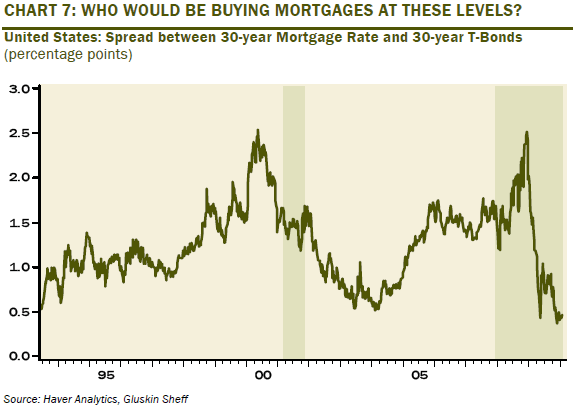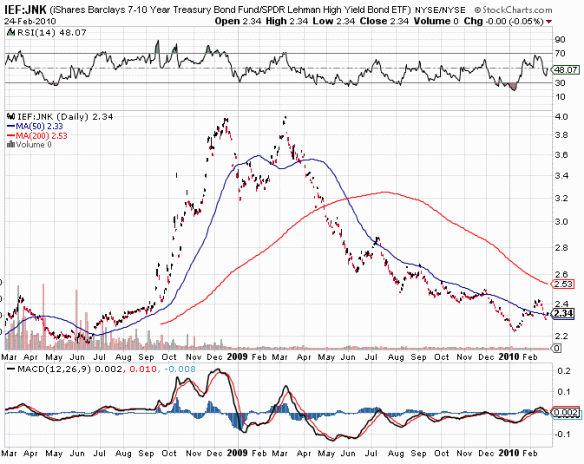Mortgages are still cheap, if you can get them. The spread over 30-year T-bonds has fallen to record lows, at just 0.2%.
St. Louis Fed
This spread is unsustainable and will be corrected by falling bond yields (rising prices) and/or rising mortgage rates. It is possible that mortgage rates fall still lower, but the spread must widen to deliver a decent risk premium (the same is true for corporate bonds). I actually would not discount the odds of yet lower mortgage rates if Treasuries rally hard, since we are going through deflation (best defined as a contraction of money and credit) and the real yield is a good deal higher than the nominal.
Lookat CPI minus food and energy (it is mainly higher oil and gas prices over the last 12 months that are holding it up):
David Rosenberg calls mortgages a bubble:
Once again, this Houdini recovery has involved a situation where mortgage rates have plunged and yet Treasury bond yields have been rising — 30-year fixed rate mortgages have fallen to 4.93% and are sitting are record-tight spreads over long Treasury bonds (see Chart 6). Historically, the average spread is 150bps and this differential is now 20bps. This is remarkable and our concern is that investors who may be exposed to mortgages are at serious risk because there is a considerable chance that these rates will be moving higher over the intermediate term — notwithstanding continued support from Uncle Sam’s pocketbook.
Investors must be reminded time and again that mortgages are callable, Treasuries are not; and we are now in a situation where net of fees, which average 70bps, anyone buying mortgage paper today is receiving a rate that is less than what the borrower is paying, How nutty is that? Remember — despite all the ridiculous comparisons to the Weimar Republic, the long bond is THE risk-free benchmark interest rate in the U.S. and with State taxes going up, Treasuries are an even further bargain because of their tax status.
Houses are still way too expensive in the US, as indicated by inventories, income multiples and rental yields, but if they fall to historically cheap levels in the coming years while mortgage rates stay low, they could be a fantastic investment. This is especially true if we later go through a period of high inflation, so that real mortgage payments drop (fixed-rate only of course) while rents and incomes rise.
This goes to show the importance of keeping hold of your cash during deflation, because there will be historic opportunities in almost every asset class.
-
More here from David Rosenberg (free account required).
PPS – Here’s an update on the long Treasury note, short junk bond play. As you can see, we are still in a very nice spot to put on the trade:





Heya i’m fresh to this, I hit upon this site I find It very helpful and it’s helped me alot. I hope to give something back and support other people like its helped me.
Thanks a load, See You Around.